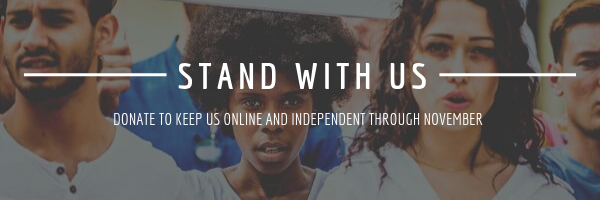During the summer of protests, workplaces, institutions and many businesses seemed to have finally “awakened” to the plight of Black folks and the injustices we face. But the conversation needs to go further.
We need to also have a discussion about the impact of white supremacy (also known as internalized racism) on our physical and mental health. The definition of internalized racism is “the acceptance, by marginalized racial populations, of the negative societal beliefs and stereotypes about themselves.” There are many spaces where internalized white supremacy has created detrimental impacts on Black people’s health. To continue Black resistance, decolonization, and dismantling white supremacy we need to address some of these realities.
In this era of multiple pandemics — COVID-19 next to systemic anti-Black and anti-Indigenous racism — discussing the impact of internalized racism on our health is crucial to furthering Black resistance, healing and emancipation.
As a global social justice health researcher and psychotherapist with a private practice, I have collected both research-based evidence as well as clinical experiences from this past year (and my many years working in community mental health) of the damage of white supremacy and internalized racism.
Some of the earliest conceptions and seminal researchers who have work on internalized racism are: W.E.B Du Bois in his 1903 The Souls of the Black Folk, Marcus Garvey in 1923, Franz Fanon on Black masks in 1952 and The Wretched of the Earth in ‘65, Albert Memmi’s work on the colonizer and the colonized in 1965, to name a few. For a review of psychological literature on internalized racism, check out the 2019 paper by: E.J.R. David, Tiera M. Schroeder and Jessicaanne Fernandez.
White supremacy
White supremacy is maintained through systems of punishment and religious indoctrination. The over 400 years of colonization’s violence on Black people’s lives, including the killing, mass incarceration, co-optation and demonizing of our resistance movements through white supremacist systems and practices, have been internalized and as a result impact our health.
Internalized white supremacy is a direct result of systemic anti-Black racism and intersectional violence. It creates pain, suffering, and rifts and divisions in our communities and movements. It occurs when folks of colour believe racist stereotypes and act them out in their daily lives. Internalized white supremacy supports systematic violence by ensuring that oppressed peoples are consumed by “whiteness” or proximity to it, as the measure of greatness or goodness.
Meanwhile, “Blackness” and other racialized identities are internalized as subservient or bad. Internalized white supremacy has its history in Black communities through the brutal enslavement of Africans.
The separation of African families and the threat of death, sexual and physical violence, racist scientific experiments, and other cruelties created feelings of powerlessness and trauma that purported whiteness as superior, and Blackness as inferior.
There is continuing research in the fields of psychology, health, medicine and education, to name a few, on internalized white supremacy (internalized racism) and its detrimental impacts on our physical and mental health.
Addressing white supremacy
If you are trying to figure out if you have experienced or witnessed internalized white supremacy, here are some anecdotal examples that I have seen:
- When Black, Indigneous or people of colour activists publicly discredit other Black folks who they deem are not as “woke” as them.
- When white activists are given more props and support for joining Black resistance than Black folks.
- When Black folks do not credit Black queer communities for supporting and creating spaces for Black resistance.
- When Black, Indigneous or people of colour activists deem protesting as the only or most “real” form of activism, and question other forms of resistance.
- When you are the only director/manager/tenured faculty and you do not advocate for other Black, Indigneous or people of colour folks at your work or distrust hiring, or mistreat Black people.
- When you preface excellence, knowledge and opportunity with “whiteness.” within academia, government, health-care, business and community among others.
The need to emancipate ourselves from internalized white supremacy is critical for our well-being and health. Our survival and continued ability to thrive depends on it. My current research, Black Health Matters COVID-19, addresses internalized white supremacy and health, among other areas. Resistance against internalized white supremacy is inevitable, over 400 years old and counting.
5 ways to resist internalized white supremacy
- Understand the root causes of internalized white supremacy. Make the connections between white supremacy and entitlement and internalization.
- Respect our heterogeneous identities and experiences, address intersectional violence, commit to a purposeful connection for meaningful Pan African resistance and unity.
- Join a healing circle with Black folks who can openly discuss the impact and ways through the pain and strain. Seek anti-oppression counselling to support the anxiety, depression and other mental health impacts.
- Exercise, eat healthy food and engage in intimacy and relaxation to reduce the impact of grief and stress on your body, mind and spirit.
- For allies, white people and non-Black folks: Step up, be accountable and responsible for dismantling white supremacist systems and practices. Call out your own community and structures. Pay for health reparations.


Roberta K. Timothy, Assistant Professor, Teaching Stream, Social and Behavioural Health Science, Dalla Lana School of Public Health, University of Toronto
This article is republished from The Conversation under a Creative Commons license. Read the original article.
Related posts:
Views: 0
 RSS Feed
RSS Feed

















 March 4th, 2021
March 4th, 2021  Awake Goy
Awake Goy 

 Posted in
Posted in  Tags:
Tags: 
















